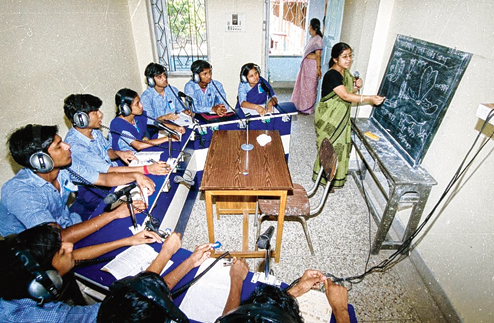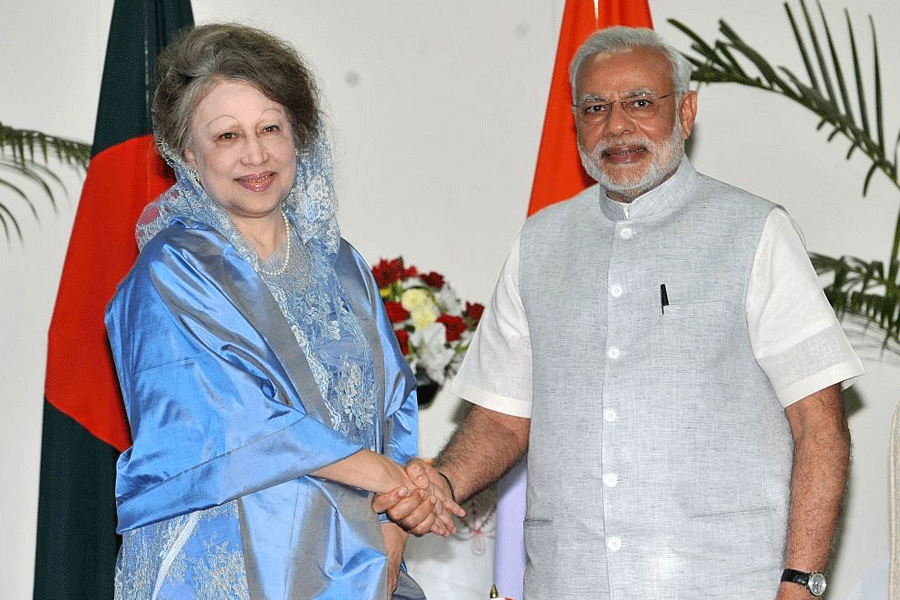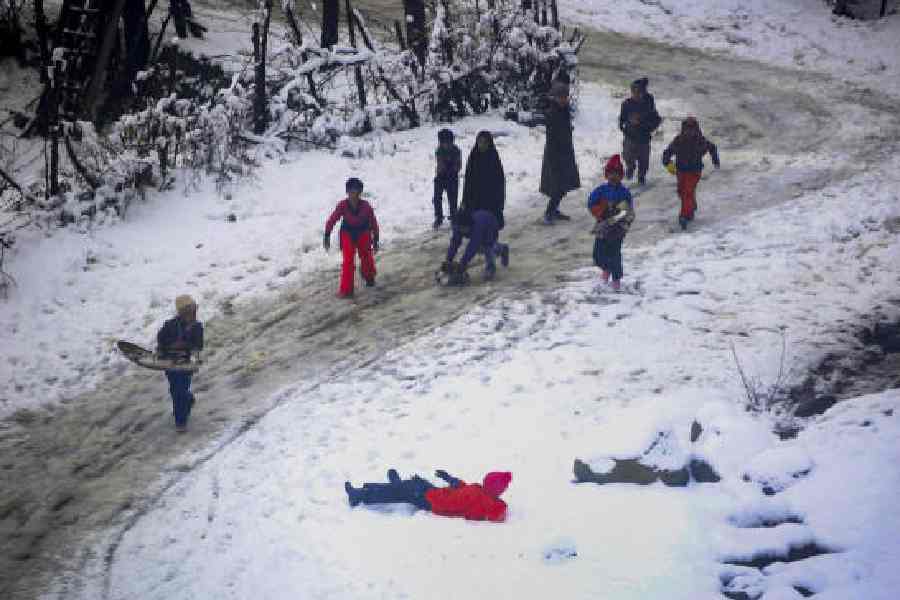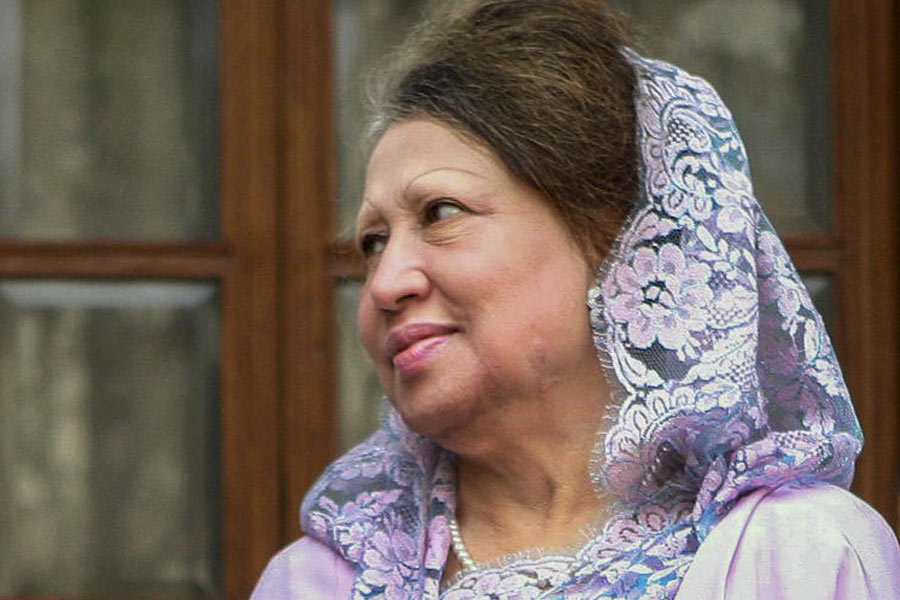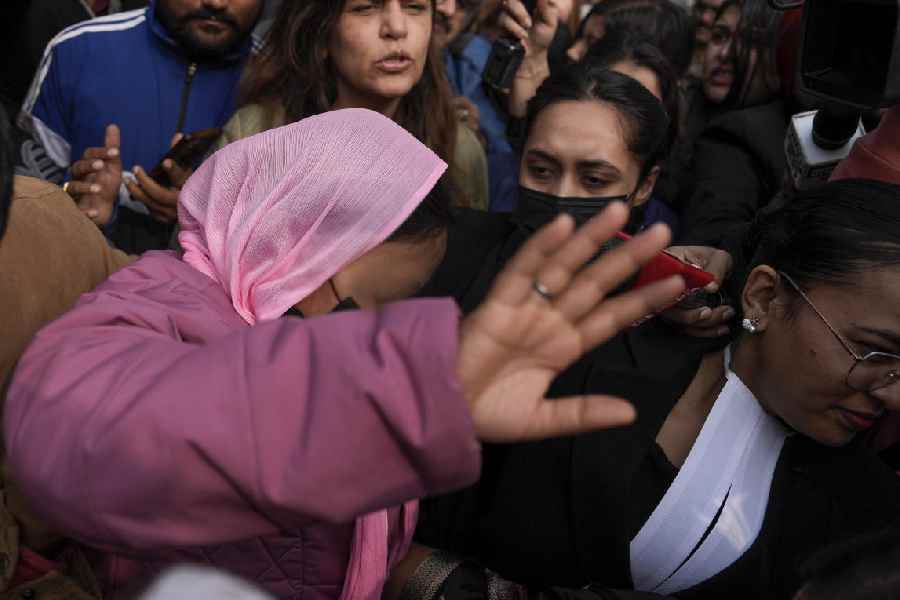 |
| A class in progress at Helen Keller Bodhir Vidyalaya, Mukundapur, one of the two Madhyamik-level schools in Calcutta for hearing impaired students |
Mita Das failed in Higher Secondary from a “regular” school this year despite a first division in Madhyamik, a case that highlights the hurdles deaf and mute students in Bengal face after Class X.
The state doesn’t have a single special school for the deaf and mute at the HS level, though around 100 hearing impaired students write Madhyamik every year. In fact, other than two Madhyamik schools — the Helen Keller Bodhir Vidyalaya in Mukundapur, where Mita had studied till Class X, and the Calcutta Deaf and Mute School in Maniktala — the state has nothing to offer.
The girl from Bishnupur in South 24-Parganas failed in nutrition and political science in the HS final because she couldn’t follow her teachers at Vidyanagar Uchha Madhyamik Balika Vidyalaya, a “regular” institution near her home where she had taken admission since “there wasn’t much choice after Class X”.
The absence of special schools forces many students to join regular institutions to continue their education or take up vocational training, according to a source in the West Bengal Board of Secondary Education.
“They hit a dead end after matriculation because most normal schools refuse to admit special students,” said Ranjit Das, the teacher-in-charge of Helen Keller Bodhir Vidyalaya. “Many students are forced to make a choice between vocational courses and open schools. Naturally, the dropout rate is quite high because of the limited options.”
Mita’s mother Anandomoyee Das said she had approached her daughter’s HS school several times, explaining her child’s needs. But the school could do little since it has no trained teachers to teach the deaf and mute.
“My daughter got good marks and wanted to study a regular course. But she was left with no choice in the absence of HS schools for children like her. She couldn’t cope with the teaching methods at the regular school. The teachers were not trained to teach the way she was taught till Class X at her special school. She could pick up only parts of a lesson written on the blackboard,” she said.
Oralism expert Tapas Sinha, who teaches at the teacher training college on the campus of Calcutta Deaf and Mute School, said it’s difficult for a regular school to replicate the methods followed by a school meant for the hearing impaired. “The basic technique is to teach a lesson simultaneously in sign language and speaking aloud all words very slowly so that the students can follow the teacher’s lip movements. Besides, almost all the lessons should be written on the blackboard.”
“This method is time-consuming and taxing too. A deaf and mute child will not have a clue of what is being said in class if the teachers speak fast,” he added.
Sinha said the other valuable component of teaching in a special school is speech therapy that improves a child’s communication skills and the ability to interact with others. “But teachers in normal schools are not trained in speech therapy.”
The future of such children isn’t bleak, though. A handful of NGOs and private institutions teach deaf and mute students.
Alokendu Bodh Niketan in Kankurgachhi teaches about 12 such students on their campus, though the students appear in the HS exams from regular schools.
“We deal with many differently abled students, all of them needing different kinds of care. A special school for the hearing impaired would definitely have been better,” said Kaberi Sil of Alokendu Bodh Niketan.
Sources said Mita’s HS school could have approached the government for help vis-a-vis appointment of special educators. “No school can refuse to admit a special child. That is illegal. They should ask for special teachers from the government,” an official said.
Vivek Kumar, secretary at the mass education department, said deaf and mute children could approach blind schools equipped to admit students with any form of disability. “There are four blind schools in the state where such students can take admission for HS classes. The teachers are trained to deal with any special children,” he said.
The four schools that he was referring to are Calcutta Blind School in Behala, Ramakrishna Mission Blind Boys Academy in Narendrapur, Vivekananda Mission Ashram in Haldia and Lighthouse for the Blind on Rashbehari Avenue in Calcutta.
Kumar’s solution doesn’t hold much water because these schools admit only visually impaired students and the government doesn’t have any plan to open HS schools exclusively for the deaf and mute.
Biswajit Ghosh, the principal of the Narendrapur-based academy, said the teachers in his school were not trained to deal with children having hearing and speech impairment.
“The training programme for visually impaired and hearing impaired is different. It is not true that our teachers are trained to deal with both,” he said.
“We have expertise in teaching visually impaired students. In casual conversations, we can communicate with hearing impaired students using gestures but teaching a subject is a different thing altogether because the teacher has to be aware of the sign language,” he added.

